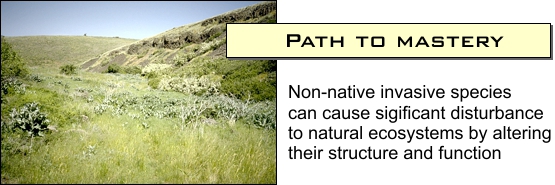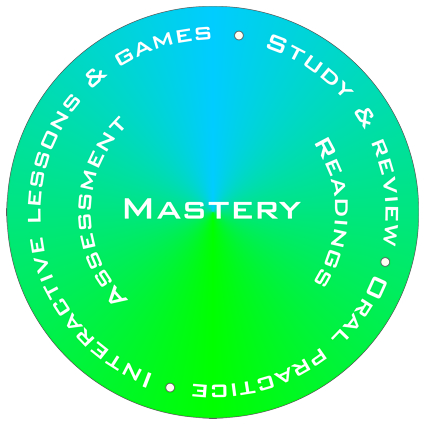
|
|||
|
Restoration ecology is a discipline within the science of
ecology that uses fundamental ecological principles for the restoration of
disturbed ecosystems – with the goal of establishing a stable and
self-sustaining ecosystem. Knowledge and understanding of ecology,
ecophysiology, and community ecology are required to understand the complex
interactions between the physical environment and organisms, and the structure
and function of ecosystems. A systems ecology approach, which includes ecosystem
modeling, is required for the effective and successful restoration of disturbed
ecosystems. It is essential that you take the initiative to seek out additional readings in ecological journals, books, and magazines at your university. |
|||
|
Mastery of the subject matter requires diligence,
focused study, and daily practice. A three-credit course requires a
minimum of nine hours of effective study per week. This flow diagram
summarizes the steps you should follow – continuously alternate
study, assessment, and review until you achieve mastery. The path to mastering the fundamental principles of ecology involves a set of highly integrated learning procedures. It is not a simple method of study and memorization. The objective is attaining a level of knowledge and understanding where you can orally explain topics in a succinct manner an in technically correct terms - as if you were teaching the subject.
|
 |
||
|
|
|||
|
|||
| Your path to mastery | |||
|
|
Follow the dynamic integration and flow among the learning levels | ||
|
|
Regular and diligent oral practice | ||
|
|
Repetition and refinement | ||
|
|
Achieve confidence in the subject matter
|
||
|
Learning tips. An excellent
way to prepare for the quizzes and examinations is to orally explain a
topic, concept, or term to a colleague. Do this regularly as if you are
teaching a course in ecology. If you can explain the course subject matter
in a succinct and technically correct manner, then you have mastered the
topic. In order to increase your performance
on the quizzes and the examinations, please be sure to follow the
recommended learning procedures on a regular bases. Cycle through
these steps repeatedly until you have mastered the material. |
|||
| Additional study and learning methods for mastering the subject | |||
|
|
Carefully study the textbook for detailed information | ||
|
|
Regularly study the glossary to master all terms and understand their meaning | ||
|
|
Study and review the lecture presentations, and the study questions in the enhanced lecture presentations | ||
|
|
Study and review the interactive lessons and games to guide your study and to evaluate your understanding | ||
|
|
Take the quizzes on the recommended schedule | ||
|
|
Study and review the sample questions for each examination
|
||
| Recommended learning resources on Internet | |||
|
|
Tutoring & Academic Assistance Programs, University of Idaho | ||
|
|
Online Learning Center - learning skills, University of Idaho | ||
|
|
Excellent study resources at HowToStudy.org | ||
|
|
Study skills guide, Saint Benedict - Saint Johns' University | ||
|
|
Videos at Academic Skills Center, Dartmouth University
|
||
| Recommended writing resources | |||
|
|
Electronic style guides, University of Idaho | ||
|
|
Writing Center, University of Idaho
|
||
| Specialty services - University of Idaho | |||
|
|
Disability Support Services | ||